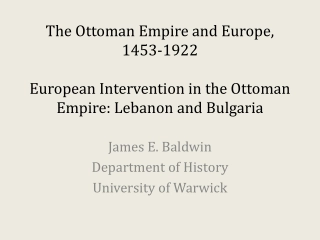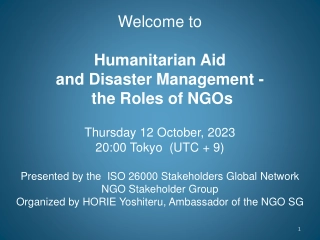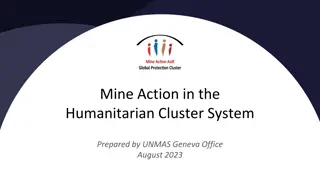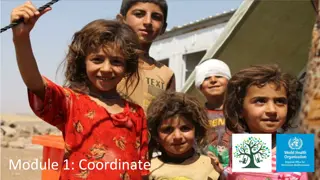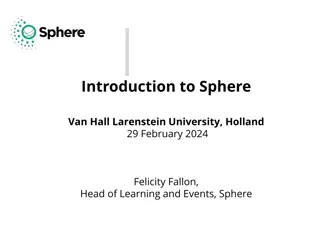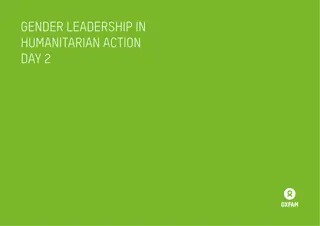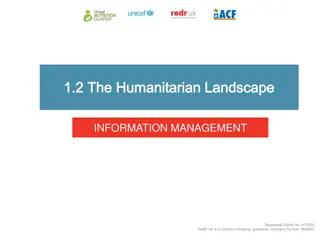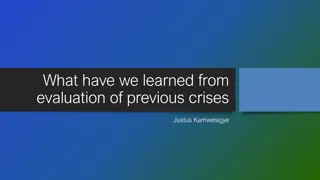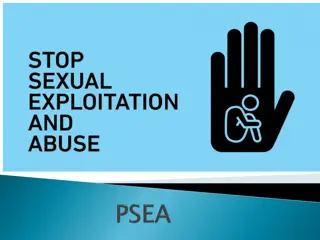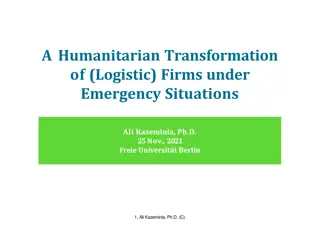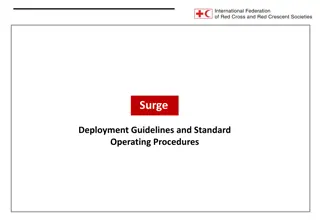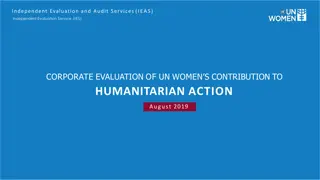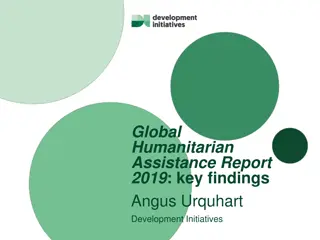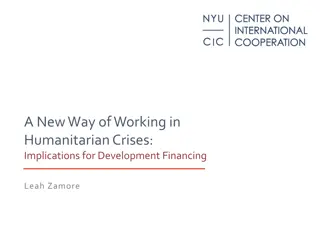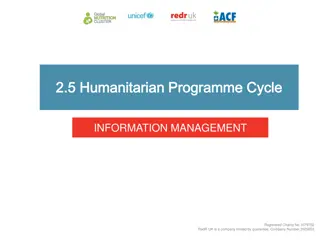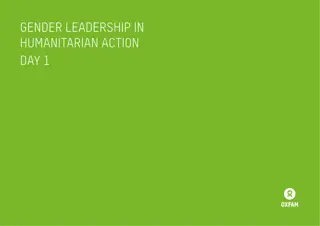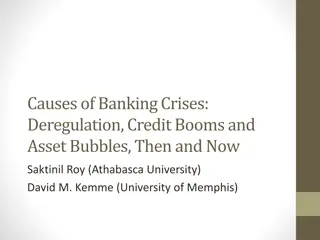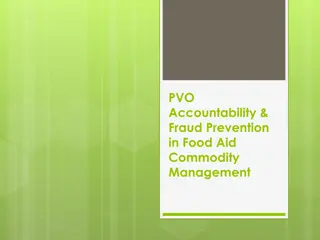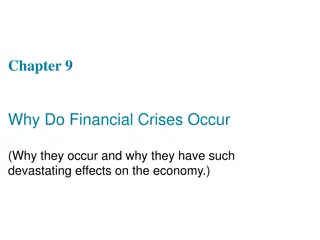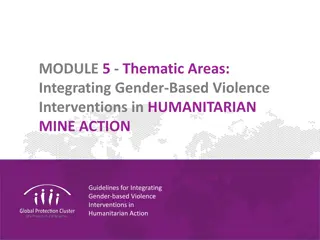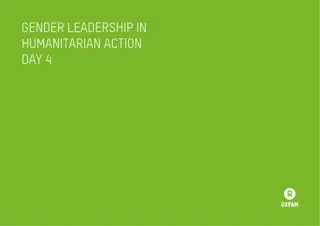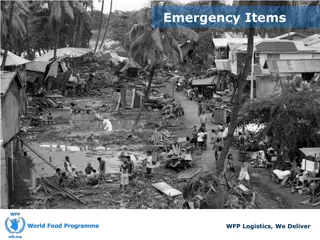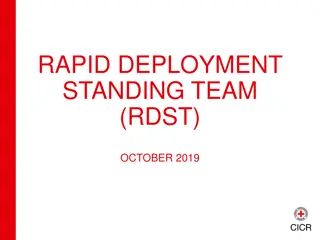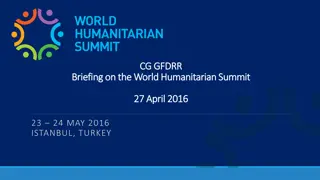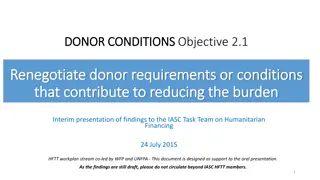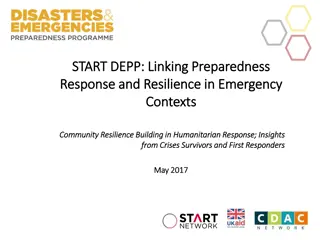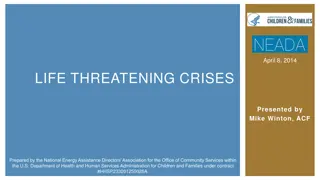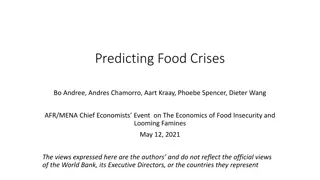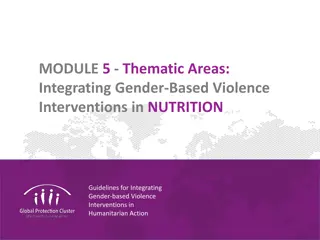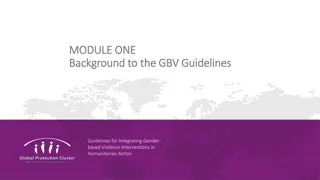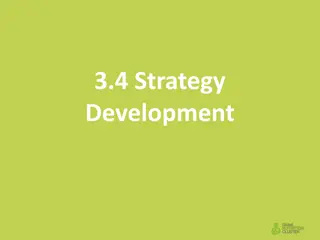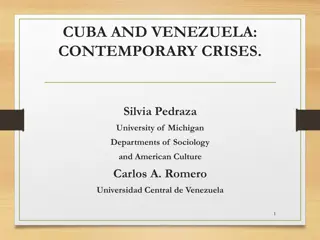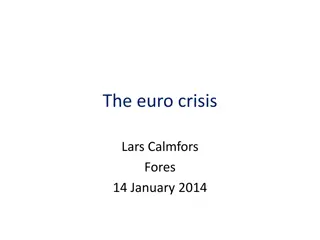European Humanitarian Intervention in the Ottoman Empire
Explore European powers' moral duty to intervene in Ottoman affairs during the 19th century, motivated by humanitarian and imperial interests. Discover the impact of the Concert of Europe and legal theories on humanitarian intervention.
3 views • 22 slides
Roles of NGOs in Humanitarian Aid and Disaster Management
Explore the crucial role of NGOs in responding to crises and disasters, as well as in the prevention and management of future emergencies. Learn about ISO 26000 guidelines on global social responsibility and how organizations can protect vulnerable groups in risk situations. Gain insights from exper
2 views • 6 slides
Food Security Cluster Coordination Meeting - Middle Shabelle Region
A coordination meeting held in Middle Shabelle Region focused on food security projects, partner updates, flood situations, and Islamic Relief Somalia's project presentation. The meeting reviewed action points, discussed current challenges, and emphasized collaboration among partners and organizatio
1 views • 26 slides
Mine Action in the Humanitarian Cluster System
The Inter-Agency Standing Committee (IASC) plays a crucial role in coordinating humanitarian efforts, with a focus on mine action in the global protection cluster. This involves clear responsibilities, strategic planning, and advocacy to address humanitarian needs. The IASC Reference Module for Clus
3 views • 18 slides
Comprehensive Guide to Assessing and Prioritizing Child and Adolescent Health in Humanitarian Settings
This module provides a detailed operational guide on assessing and prioritizing child and adolescent health in humanitarian settings. It covers obtaining data on child/adolescent health, coordinating responses, planning activities, and utilizing data systems for monitoring and evaluation. Key compon
7 views • 31 slides
Humanitarian Action and Coordination: Essential Guidelines and Standards
This comprehensive guide provides insights on coordinating child and adolescent health in humanitarian settings, emphasizing the importance of understanding and implementing key actions. It covers the utilization of resources like the operational guide, self-assessment tracker, and core humanitarian
2 views • 43 slides
Understanding Sphere: Humanitarian Standards and Practices
Learn about Sphere, a global movement focusing on humanitarian standards and quality assistance. Explore the Sphere Handbook, its philosophy, and the importance of humanitarian standards. Discover the key areas covered in the Handbook and why they are essential for effective crisis response. Join a
11 views • 31 slides
Gender-Responsive Humanitarian Leadership and Transformation
Challenges in implementing gender-responsive humanitarian programmes require greater political will, leadership, resources, accountability, and capacity building. Feminist leadership aims to transform power dynamics, fight inequality, and create inclusive structures. It involves principles, values,
6 views • 14 slides
Understanding Humanitarian Landscape and Coordination Challenges
The humanitarian landscape involves various organizations working together to provide assistance during crises. Coordination challenges, such as identifying needs, existing assistance, and government involvement, have been prevalent. The Inter-Agency Standing Committee (IASC) was established in 1991
1 views • 21 slides
Insights from Evaluation of Previous Humanitarian Crises and Core Humanitarian Standards
Evaluation of past crises reveals the importance of core humanitarian standards in providing timely, coordinated, and effective assistance. Learning from experience, feedback mechanisms, and competent staff are key for addressing humanitarian crises. Data and systems play a crucial role in monitorin
0 views • 13 slides
Inter-Cluster Coordination and Information Management in Humanitarian Emergencies
Inter-Cluster Coordination and Information Management play vital roles in humanitarian emergencies. The coordination mechanism involves regular meetings convened by the RC/HC and coordinated by OCHA, providing opportunities for clusters to collaborate on shared planning, needs assessments, and poole
3 views • 13 slides
Understanding PSEA: Prevention and Response to Sexual Exploitation and Abuse in Humanitarian Settings
Sexual exploitation and abuse in humanitarian settings pose serious threats to vulnerable populations, directly contradicting humanitarian principles. The establishment of initiatives like the Iraq PSEA Network aims to prevent and respond to such misconduct through awareness-raising, capacity buildi
0 views • 14 slides
Humanitarian Transformation of Logistic Firms in Emergency Situations
This research explores how logistic firms evolve into humanitarian entities in response to grand challenges like natural disasters and refugee crises. Case studies and data collection methodologies are utilized to understand the transformation process, as seen in examples such as SOS Mediterrane and
0 views • 8 slides
Surge Deployment Guidelines and Standard Operating Procedures
Surge Deployment Guidelines and Standard Operating Procedures outline the principles and processes for deploying specialized personnel to support humanitarian operations in various emergencies. The guidelines aim to ensure equal opportunity, transparent processes, and quality responses among Red Cro
0 views • 12 slides
Corporate Evaluation of UN Women's Contribution to Humanitarian Action
The Independent Evaluation and Audit Services conducted an evaluation of UN Women's work in humanitarian action from 2014-2018, assessing its relevance, effectiveness, and sustainability. The evaluation emphasized the need for stronger links between UN Women's global normative work and humanitarian
0 views • 9 slides
Global Humanitarian Assistance Report 2019 Key Findings
The Global Humanitarian Assistance Report 2019 explores key findings regarding international humanitarian assistance, multi-year funding growth, funding to UN agencies, cash and voucher programs, and direct funding to local and national actors. The report highlights the challenges and disparities in
4 views • 11 slides
Management Strategies for Crisis in Tourism Industry
Explore the crucial role of crisis management in the tourism sector, understanding how internal and external shocks impact the industry. Discover the ripple effects of crises on a global scale and delve into various approaches to studying and managing crises effectively. Gain insights into the lifec
0 views • 9 slides
Innovative Approaches in Humanitarian Crises and Development Financing
This study explores the New Way of Working in humanitarian crises, focusing on reinforcing national systems, anticipating crises, and transcending humanitarian-development divides. Promising trends include rising government ownership and increased linkages between humanitarian activities and governm
0 views • 6 slides
Understanding the Humanitarian Programme Cycle (HPC)
The Humanitarian Programme Cycle (HPC) is a coordinated series of actions aimed at preparing for, managing, and delivering humanitarian responses efficiently. It focuses on delivering fast, coordinated, effective, and protection-driven aid to those affected by crises. Central to the HPC is the invol
2 views • 8 slides
Promoting Gender Equality in Humanitarian Action
Understand the importance of promoting gender equality in humanitarian action, including principles, challenges, and the need to transform attitudes and beliefs. Learn key global standards, gender analysis, and leadership in humanitarian settings. Explore the rights of women and girls, gender inequa
1 views • 15 slides
Analysis of Banking Crises: Deregulation, Credit Booms, and Global Impacts
This study delves into the causes and patterns of banking crises, focusing on deregulation, credit booms, and asset bubbles. It compares the global financial crisis of 2008-2009 with historical crises worldwide, highlighting common factors leading to such events. The research discusses the role of l
0 views • 23 slides
Corruption and Accountability in Food Aid Management
Corruption in humanitarian aid, particularly in the management of food aid commodities, deprives the most vulnerable of essential resources, hindering the noble goal of saving lives during crises. Examples from the Liberia-Sierra Leone refugee crisis shed light on the rampant corruption, where benef
0 views • 16 slides
Understanding Financial Crises and Their Impacts
Financial crises arise due to disruptions in financial markets, leading to severe economic consequences. This text delves into the definition, stages, causes, and effects of financial crises, with a focus on the global financial crisis of 2007-2009 and the European Sovereign Debt Crisis. It also dis
0 views • 28 slides
Guidelines for Integrating Gender-Based Violence Interventions in Humanitarian Action
This module focuses on integrating gender-based violence interventions into humanitarian mine action, providing guidelines, agenda, outcomes, and strategies for implementation. It emphasizes informing and supporting humanitarian actors to develop action plans and accountability measures to address g
0 views • 56 slides
Gender Equality in Humanitarian Crises: Empowering Women and Girls
Addressing gender equality in humanitarian crises is crucial for empowering women and girls. Access and participation in facilities and activities, meaningful participation, dignity, and empowerment are key aspects to consider. Women's empowerment spans various spheres and requires holistic approach
0 views • 33 slides
Emergency Items Management in Humanitarian Logistics
Explore the challenges and specifics of managing emergency items like shelter, WASH, food, and health products in warehouses during humanitarian crises. The exercise involves classifying items, determining constraints, and discussing solutions.
0 views • 14 slides
Rapid Deployment Standing Team (RDST) for Humanitarian Crisis Response
A comprehensive overview of the Rapid Deployment Standing Team (RDST) initiative launched in October 2019 for swift and effective crisis response. The RDST comprises specialized coordinators and managers to address various aspects of crisis management, including staffing gaps and support services. W
0 views • 5 slides
Insights from the World Humanitarian Summit Briefing
The World Humanitarian Summit, held in Istanbul, Turkey, saw significant participation and contributions. Key topics included consultations, core responsibilities, roundtable discussions, and commitments to address global challenges such as forced displacement, gender equality, and climate change. T
0 views • 15 slides
Renegotiation of Donor Conditions for Humanitarian Financing
This interim presentation outlines the objective of renegotiating donor requirements to reduce burden in humanitarian financing. Findings focus on the severity of conditions, methodology used, respondents involved, general findings, and top conditions affecting humanitarian principles. The document
0 views • 12 slides
Insights on Community Resilience Building in Humanitarian Response
This study explores the perceptions and recommendations of local stakeholders, including first responders and survivors of crises, on strengthening humanitarian response to foster long-term community resilience. Key findings include the importance of community involvement, coordination with governme
0 views • 10 slides
Managing Life-Threatening Crises in Energy Assistance Programs
This document outlines statutory requirements, intervention concepts, crisis components, definitions of crisis and life-threatening crises, and the process of applying for crisis assistance in energy-related emergencies. Grantees must act promptly to resolve crises within specific timeframes, ensuri
0 views • 17 slides
Predicting Food Crises: A Comprehensive Analysis
Food insecurity is a significant issue, especially in developing regions like Africa, exacerbated by factors such as climate change and population growth. Despite the importance of early prevention, there is limited literature on predicting food crises, unlike conflict outbreaks. This study by Bo An
0 views • 15 slides
Impact of Banking Crises on the Real Economy: Lessons from History
Understanding the influence of banking crises on the real economy, particularly during the Great Depression, where massive bank suspensions triggered economic turmoil. The interplay between banking panics, monetary deflation, bank failures, loss of credit information, and debt deflation worsened the
0 views • 55 slides
Integrating Gender-Based Violence Interventions in Humanitarian Nutrition Programs
This module focuses on integrating gender-based violence interventions in humanitarian nutrition guidelines. It covers key areas such as linking GBV and humanitarian programming, implementing guidance, assessment, resource mobilization, and developing action plans. The aim is to inform nutrition act
0 views • 56 slides
Enhancing Gender-based Violence Interventions in Humanitarian Action
The guidelines focus on integrating gender-based violence interventions into humanitarian action, emphasizing key changes and additions such as structural modifications, contextual considerations, and enhanced accountability. Led by UNICEF and UNFPA, the revision process involved extensive consultat
0 views • 21 slides
Understanding Humanitarian Response Plans and Flash Appeals
This content explores the features and functions of Flash Appeals and Humanitarian Response Plans (HRP) in crisis management. It delves into the role of clusters in developing these plans, the processes involved in responding to sudden or protracted crises, and the significance of coordination and s
1 views • 17 slides
Cuba and Venezuela: Contemporary Crises Analysis
Analyzing the contemporary crises in Cuba and Venezuela, this study delves into the deep-rooted issues affecting both countries. From economic struggles to demographic challenges and political alliances, the research highlights the key factors contributing to the crises. Despite attempts at reforms
0 views • 35 slides
James Nachtwey: A Pioneer in Humanitarian Photography
James Nachtwey, a renowned photographer, started his career capturing civil unrest in Northern Ireland. His impactful work with NGOs like the International Committee of the Red Cross has led to significant humanitarian efforts, saving millions of lives. Despite debates on exploitation, Nachtwey's im
0 views • 9 slides
Understanding the Euro Crisis: Interrelated Challenges and Strategies
The Euro crisis, analyzed through government bond yields, interrelated crises (sovereign debt, bank, growth, and competitiveness crises), government debt dynamics, and strategies to tackle sovereign debt crises with rescue loans and fiscal austerity conditions. The interconnected nature of the crise
0 views • 20 slides
Analysis of Banking Losses During Crises: Charts in Staff Memo 3/2014
This collection of charts depicts the losses incurred by banks during crises in various sectors such as households, building, construction, and non-financial enterprises in different countries like Norway, the United Kingdom, and Iceland over different time periods. The data includes write-downs and
0 views • 11 slides
